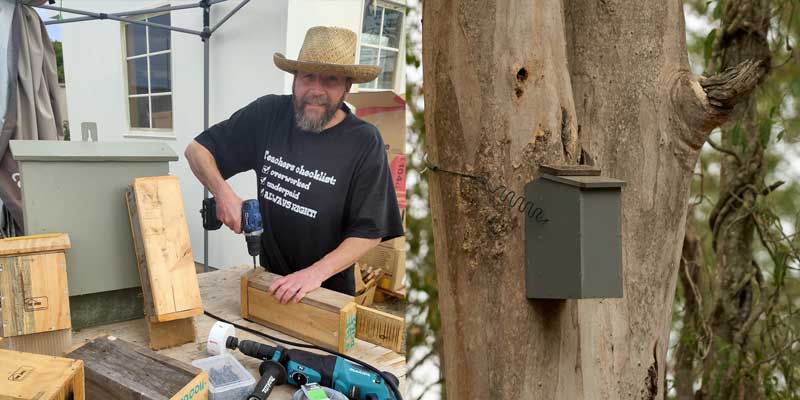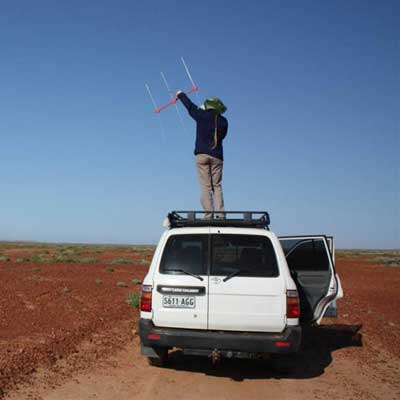Special funds from UniSA to support community and wildlife recovery on Kangaroo Island
By Michèle Nardelli
 ENVIRONMENT AND SUSTAINABILITY Kangaroo Island resident John Bancan making an emergency nest box – one of a number of community projects under way on KI, supported by new funding from UniSA.
ENVIRONMENT AND SUSTAINABILITY Kangaroo Island resident John Bancan making an emergency nest box – one of a number of community projects under way on KI, supported by new funding from UniSA.UniSA has unlocked special funds to help fire-ravaged Kangaroo Island with wildlife recovery.
The one-year funding will support local part-time positions to work alongside local and state organisations, landholders, and the community. Funding will also support capacity-building workshops and research projects.
 Associate Professor Topa Petit undertaking research.
Associate Professor Topa Petit undertaking research.UniSA researcher Associate Professor Topa Petit, who was working on the island when her research was interrupted by the fires, says she shared the frustration of many who felt powerless to help during the fires.
“The aim of the UniSA Vice Chancellor’s Fund is to speed the recovery process and empower the community in their efforts towards on-ground wildlife recovery,” Assoc Prof Petit says.
“The Vice Chancellor [Professor David Lloyd] responded immediately to an appeal supported by KI Wildlife Network, KI Land for Wildlife, Friends of Parks Western District, local landholders, and a large group of community members in mid-January.
“The new positions will liaise with stakeholders to identify needs and strategies, conduct projects with the community, organise workshops, and help with grant applications.”
Assoc Prof Petit says the Kangaroo Island (KI) community is already several weeks into an emergency nest box project that is guided by scientific principles.
“Western KI is the first biodiversity hotspot for South Australia and everyone here is keen for all actions to be scientifically sound so that outcomes can be evaluated and adapted, and used in future recovery,” she says.
“But this funding is also important for the recovery of the people on KI.
“The nest box project, for example, engages a large group of the community.
“The generosity of those involved in the project is heart-warming, as is the response from our Vice Chancellor to the plight of the island’s people and wildlife.
“Many people have lost homes, crops, and livestock in dreadful conditions.
“They need time and the support of friends and family, and it’s up to the rest of us to assist with habitat recovery. We all need to come together for whole-island recovery.”
Several local residents have been appointed to part-time positions sponsored by the UniSA’s Vice Chancellor’s Fund for KI.
In the future, UniSA also plans to bring students on field camps to assist with specific projects. Members of the public can contribute to the projects by making a donation to Environmental Research at UniSA.
For more information about the nest box project and other research efforts on KI email Assoc Prof Topa Petit Sophie.Petit@unisa.edu.au
Other Stories
- $10m fund established to support UniSA’s most vulnerable students amid COVID-19 fallout
- Helping each other through ‘normal’ fear and panic
- Help at hand for staff making the switch to online teaching
- Six strategies to juggle work and young kids at home
- Working from home? Count your virtual blessings
- From the Vice Chancellor
- Achievements and Announcements
- How to set up healthy habits during social distancing
- Celebrating Denise: innovator, trailblazer and leader
- Pets give their humans a strong rationale for life
- Special funds from UniSA to support community and wildlife recovery on Kangaroo Island
- UniSA working on ‘pandemic drone’ to detect coronavirus
- MOD. and Hawke Centre expand online offerings
- “What do stars do? They shine” … UniSA honours author and creative dynamo, Neil Gaiman
- IN PICTURES: International Women's Day and National Apology breakfasts




